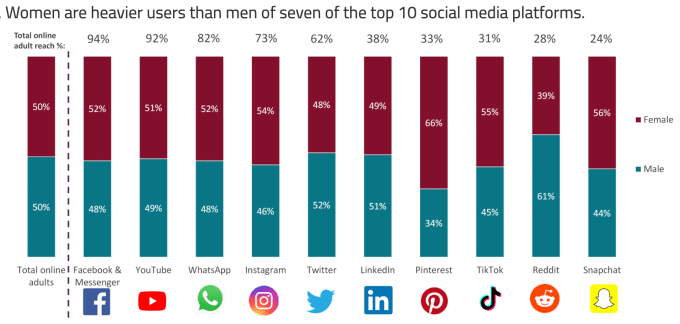Ofcom, the UK’s soon-to-be social media harms watchdog under incoming Online Safety legislation, has warned tech platforms that they are failing to take women’s safety seriously.
Publishing new research (PDF) into the nation’s online habits today, Ofcom said it has found that female Internet users in the UK are less confident about their online safety than men, as well as being more affected by discriminatory, hateful and trolling content.
Its study, which involved the regulator polling some 6,000 Brits to understand their online experiences and habits, also indicates that women feel less able to have a voice and share their opinions on the web than male counterparts — and that’s despite another finding from the study that women tend to be more avid users of the Internet and major social media services.
Ofcom found women spend more than a quarter of their waking hours online — around half-an-hour each day more than men (4hrs 11min vs. 3hrs 46min).
Image credits: Ofcom’s Online Nation 2022 report
The regulator is urging tech companies to listen to its findings and take action now to make their platforms more welcoming and safe for women and girls.
While the regulator doesn’t yet have formal powers to force platforms to change how they operate, under the Online Safety Bill that’s currently before parliament — which is set to introduce a duty of care on platforms to protect users from a range of illegal and other types of harms — it will be able to fine rule-breakers up to 10% of their global annual turnover. So Ofcom’s remarks can be seen as a warning shot across the bows of social media giants like Facebook and Instagram owner, Meta, which will face close operational scrutiny from the regulator once the law is passed and comes into effect — likely next year.
In a statement accompanying the research, Ofcom’s CEO, Melanie Dawes, said:
“The message from women who go online is loud and clear. They are less confident about their personal online safety, and feel the negative effects of harmful content like trolling more deeply.
“We urge tech companies to take women’s online safety concerns seriously and place people’s safety at the heart of their services. That includes listening to feedback from users when they design their services and the algorithms that serve up content.”
Discussing the findings with BBC Radio 4’s Today program this morning, Dawes further emphasized that the research shows — “on every measure” — that women feel less positive about being online than men do. “They simply feel less safe and they’re more deeply affected by hate speech and trolling,” she added. “As a result there’s a chilling effect, to be honest — women feel less able to share their opinions online and less able to have their voices heard.”
Another finding from the research highlights the greater impact negative online experiences can have on women’s mental health, especially for younger women and black women — with Ofcom finding that women aged 18-34 were more likely …read more
https://techcrunch.com/2022/06/01/ofcom-women-online-nation-2022-report/
